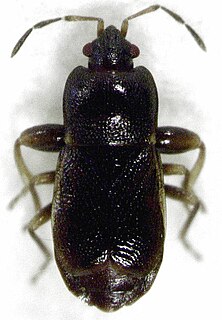
The Lygaeoidea are a sizeable superfamily of true bugs, containing seed bugs and allies, in the order Hemiptera. There are about 16 families and more than 4,600 described species in Lygaeoidea, found worldwide. Most feed on seeds or sap, but a few are predators.

The Lygaeidae are a family in the Hemiptera, with more than 110 genera in 4 subfamilies. The family includes the insects commonly known as milkweed bugs, and also some of those known as seed bugs. The family used to be vastly larger, as numerous former subfamilies have been removed and given independent family status, including Artheneidae, Blissidae, Cryptorhamphidae, Cymidae, Geocoridae, Heterogastridae, Ninidae, Oxycarenidae, Pachygronthidae, and Rhyparochromidae, which together constituted well over half of the former family. Many of the species feed on seeds, although some feed on sap (mucivory), and a few, such as the wekiu bug, feed on insects.

The Rhyparochromidae are a large family of true bugs, many of which are commonly referred to as seed bugs. The family includes two subfamilies, more than 420 genera, and over 2,100 described species.

Heterogastridae is a family of lygaeoid bugs consisting of about 20 genera and more than 100 species.

The Blissidae are a family in the Hemiptera, comprising nearly 50 genera and 400 species. The group has often been treated as a subfamily of the Lygaeidae, but was resurrected as a full family by Thomas Henry (1997).

Oxycarenidae is a family of true bugs in the order Hemiptera. There are more than 20 genera and 140 described species in Oxycarenidae.

Cymidae is a family of true bugs in the order Hemiptera. There are about 12 genera and at least 60 described species in Cymidae.

Geocoridae is a family of big-eyed bugs in the order Hemiptera. There are more than 30 genera and 290 described species in Geocoridae.
Meropachyinae is a subfamily of leaf-footed bugs in the family Coreidae. There are at least 25 genera and 50 described species in Meropachyinae.

Metacanthinae is a subfamily of stilt bugs in the family Berytidae. There are about 12 genera and 80 described species in Metacanthinae.

Artheneidae is a family of true bugs in the order Hemiptera. It was formerly included in Lygaeidae. There are about 7 genera and at least 20 described species in Artheneidae.

Gampsocorinae is a subfamily of stilt bugs in the family Berytidae. There are about 13 genera and 60 described species in Gampsocorinae.

Pachygronthidae is a family of true bugs in the order Hemiptera. There are about 14 genera and more than 80 described species in Pachygronthidae.

Ninidae is a family of true bugs in the order Hemiptera. There are about 5 genera and 14 described species in Ninidae.
Colobathristidae is a family of true bugs in the order Hemiptera. There are more than 20 genera and 90 described species in Colobathristidae.
Cryptorhamphidae is a family of true bugs in the order Hemiptera. There are at least two genera and four described species in Cryptorhamphidae.
Malcidae is a family of true bugs in the order Hemiptera. There are at least 3 genera and more than 40 described species in Malcidae.
Meschiidae is a family of true bugs in the order Hemiptera. There are at least two genera and about five described species in Meschiidae.

Plinthisinae is a subfamily of dirt-colored seed bugs in the family Rhyparochromidae, containing only two genera. Bosbequius is monotypic genus with the single species Bosbequius latus. The other, Plinthisus, has more than 100 species.

Ischnorhynchinae is a subfamily of seed bugs in the family Lygaeidae. There are about 16 genera and more than 70 described species in Ischnorhynchinae.

















